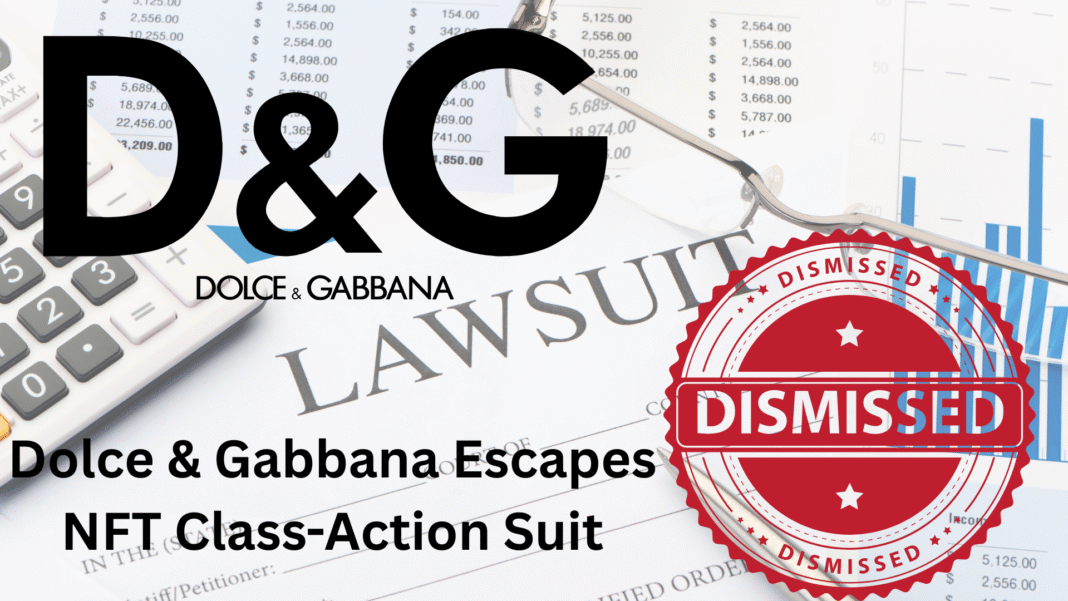A federal judge in New York threw out a class‑action suit against Dolce & Gabbana USA Inc. The case stemmed from claims that the US branch was the same as its Italian parent and had abandoned a digital token project called “DGFamily.”
Judge Naomi Reice Buchwald said the suit failed because the US arm is not an “alter ego” of the Italy‑based Dolce & Gabbana SRL.
Legal Fight Over NFTs
A group of buyers sued Dolce & Gabbana and its US unit. They said both entities sold NFTs in 2022 but did not deliver promised perks.
The buyers said more than $25 million went to the company while they waited for rewards. They updated the complaint in September, insisting the two companies were the same.
The plaintiffs claimed that Dolce & Gabbana and a Dubai marketplace, UNXD Inc., made and pushed the DGFamily tokens together. According to the suit, holders should have received digital clothes for the Decentraland world, real garments, and live events.
These benefits were to arrive at a 1‑per‑quarter pace over 2 years. The buyers said most perks never came, and the company kept their money.
US Arm’s Defense
Dolce & Gabbana USA moved to dismiss the case in January. It argued that it never joined any venture with UNXD or others to sell or market these NFTs.
The US firm said the Italian parent led the project, not its New York branch. It added that the complaint mixed up the two companies without showing real links.
Judge Buchwald agreed that the suit did not match the law. She pointed out that the plaintiffs used “Dolce & Gabbana” to mean both companies without saying who did what. She noted that only Dolce & Gabbana USA was served papers in the US.
Also Read: Pennsylvania Man Admits to Hiding $13M in NFT Profits That Led to $3.2M in Unpaid Taxes
The other named defendants, UNXD and Bluebear Italia SRL, were not served. Because the US arm stood alone, the case against it could not go forward.
Other Defendants Unserved
The ruling also left the fate of the wider case unclear. UNXD in Dubai and Bluebear Italia in Italy were named too, but never got the complaint.
The court record shows no sign they were notified. Without a US‑based link, the lawsuit cannot move ahead unless new steps are taken to serve these groups.
This case shines a light on the gap between real products and digital tokens. Fashion houses face a new world where clothes meet code.
Physical goods sell in one market. Digital art and tokens are sold in another way. When companies mix the two, buyers must trust tech and tradition at the same time.
The DGFamily tokens were built on the Ethereum blockchain. They were part of a larger push by brands into the “D & G Metaverse.” That experiment shows how hard it can be to keep digital projects on track. As more firms launch NFTs, they must weigh legal and tech risks.
Similar Claims Against Nike
At the same time, Nike is facing its own lawsuit. Buyers of Nike‑themed tokens say the company suddenly shut down its digital site.
They claim they lost big after investing in crypto assets with Nike branding. These suits highlight how fast the digital asset world can shift and how buyers can get hurt.
The judge’s decision marks a win for Dolce & Gabbana’s US arm but leaves open questions about its parent and partners. As courts sort out who is responsible, other brands will watch carefully.
Also Read: Hashling NFT Investors Sue Founder Over Millions In Misappropriated Funds


